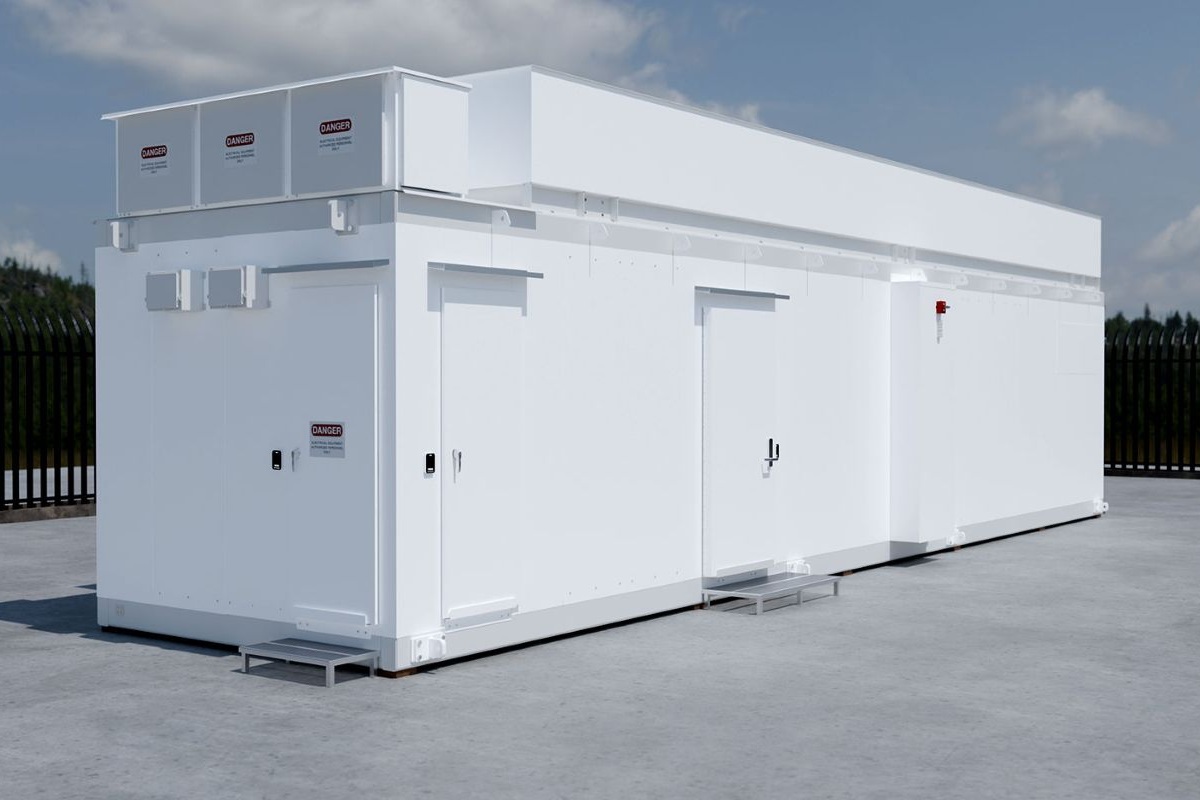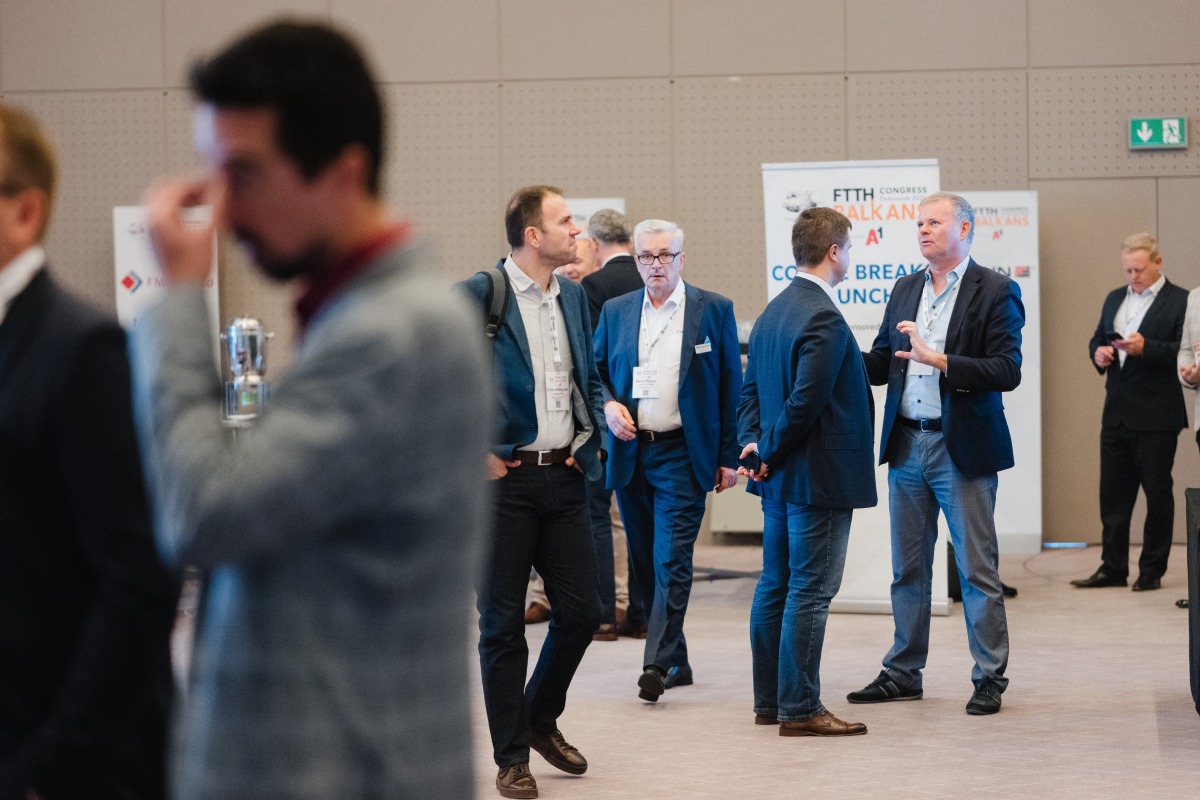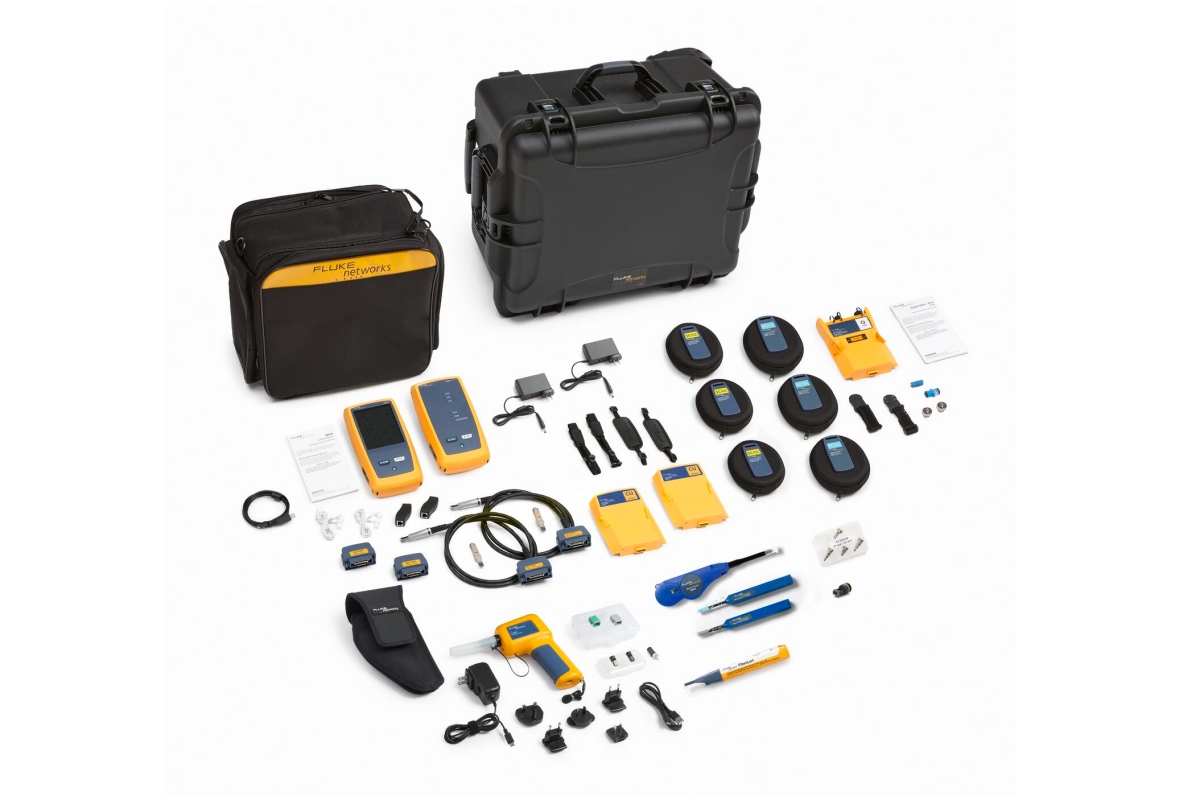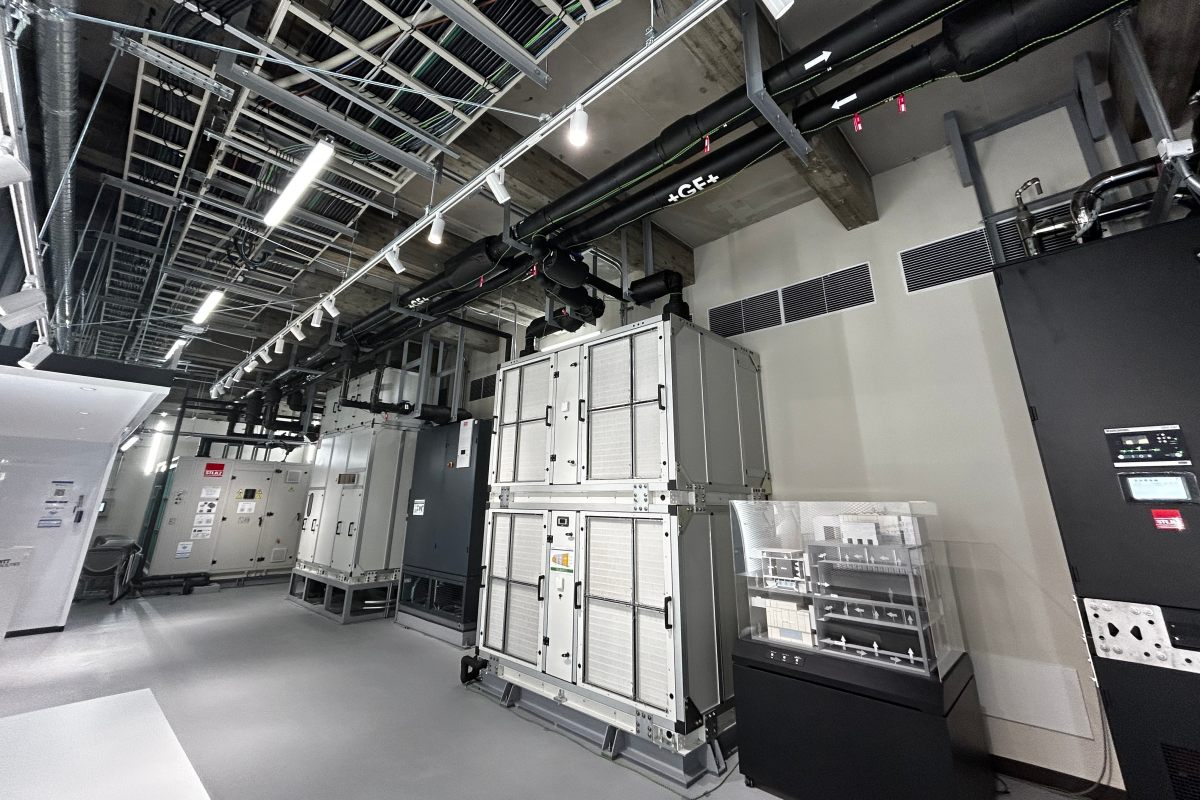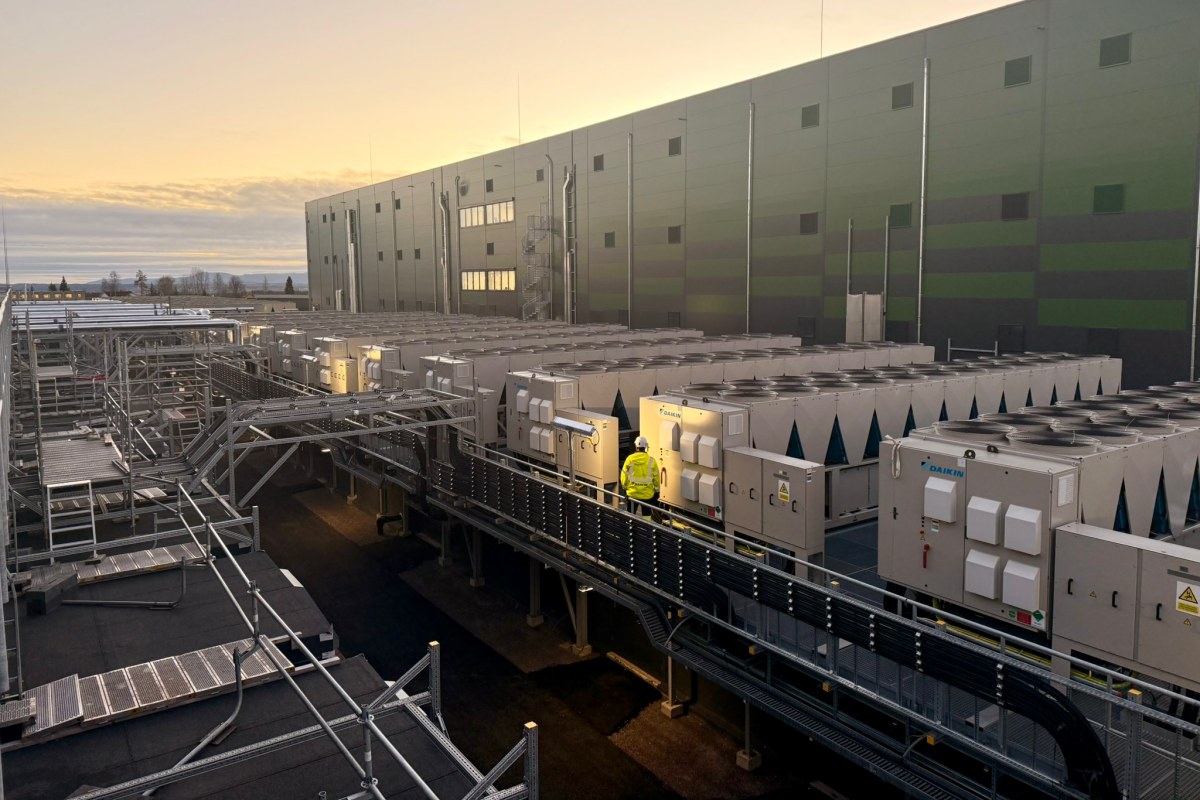Data Centre Infrastructure News & Trends
Data Centre Infrastructure News & Trends
Data Centres
News
CDM unveils DC platforms for the AI era
Compu Dynamics Modular (CDM), an AI-era modular data centre solutions company drawing on Compu Dynamics’ two decades of comprehensive data centre expertise, has launched two modular data centre solutions engineered to overcome the toughest data centre bottlenecks: ultra-high density, rapid deployment, and seamless scaling across edge to core. The CDM L Series is purpose built and optimised for AI learning/training and ultra-high-density workloads, and the CDM I Series is an all-in-one solution designed for AI inference at the edge.
Ron Mann, Vice President of Compu Dynamics Modular, comments, “With AI pushing traditional infrastructure limits and no end in sight, we’ve developed two unique, purpose-built modular data centre solutions for learning, inference, and edge. Designed for efficiency and flexibility, these solutions ensure our customers never have to compromise. CDM is redefining the possibilities of modular data centres, and our products are built to handle the requirements of tomorrow’s landscape.”
As AI workloads grow exponentially, CDM believes that traditional data centres are increasingly falling short in terms of meeting speed, density, and flexibility requirements. CDM’s two new platforms will address this challenge by offering customers solutions for both AI and edge workloads, which demand different densities, scales, and deployment models.
“These innovative new platforms are the result of 20-plus years of expertise in data centre design and deployment,” states Steve Altizer, President and CEO of Compu Dynamics. “The Compu Dynamics Modular team has created two much-needed solutions that are built to grow and evolve with the applications they support.”
Features of the CDM L Series include:• Purpose built and optimized for ultra-high density AI workloads• Engineered for 50–250+ kW per rack• Scalable from 1.5 to 3+ MW• Dual-module architecture, delivering powerful performance for next-generation AI applications• Ideal for hyperscale, colocation, and GPU-intensive environments• Designed and built in the USA• Customisable base module and open OEM integration
Features of the CDM I Series include:
• Designed for edge deployments requiring fewer AI racks, or lower IT density per module• Engineered for 50–250+ kW per rack• Supports up to 500 kW per module with air cooling and 1+ MW with combined air and liquid cooling• Compact, all-in-one architecture to reduce space, streamline deployment and reduce complexity• Ideal for telecom, healthcare, education, and government sectors• Designed and built in the USA• Customisable base module and open OEM integration
Both platforms also offer fast, flexible deployment and seamless scalability, as well as being technology neutral, supporting multiple IT hardware and infrastructure OEM equipment sources with no vendor lock-in. CDM provides full-service, end-to-end support for these platforms, from evaluation to delivery and ongoing preventive maintenance. The company’s turnkey and vendor-neutral approach to modular solutions accelerates deployment while reducing costs. With this launch, CDM says that it is empowering customers to face the AI era fully prepared and confident in the company's infrastructure.
For more from Compu Dynamics Modular, click here.
Simon Rowley - 17 September 2025
Data Centre Infrastructure News & Trends
Enterprise Network Infrastructure: Design, Performance & Security
Events
News
FTTH Congress CEE 2025 to focus on fibre rollout
The FTTH Congress CEE 2025 will take place on 7–8 October at the DoubleTree by Hilton in Warsaw, Poland, bringing together policymakers, operators, investors, and technology providers to address fibre deployment challenges and opportunities across Central and Eastern Europe (CEE).
The two-day event, organised by the FTTH Council Europe, is expected to draw more than 400 delegates from across the region’s broadband ecosystem.
Fibre challenges and opportunities in CEE
According to the latest FTTH/B Market Panorama, the CEE region still has more than 13 million homes without fibre access, with rural areas presenting the largest gaps.
While markets such as Poland and Romania have seen rapid deployment, others - including Czechia and parts of the Baltics - continue to face regulatory and investment obstacles.
Vincent Garnier, Director General of the FTTH Council Europe, says, “Central and Eastern Europe represents both one of the continent’s biggest fibre challenges and one of its greatest opportunities.
"With millions of homes still unconnected, this Congress is about ensuring that ambition translates into action by bringing together the actors who can make fibre a reality across the region.”
Programme highlights
The programme includes keynote sessions, technical presentations, and national market debates, with participation from the European Commission, BEREC, national regulators, operators, infrastructure investors, and vendors.
Key themes will cover:
• Regulatory frameworks and funding to accelerate deployment• Investment models and cross-border partnerships• Innovations in network resilience and open access models• The role of fibre in smart cities, inclusive growth, and digital sovereignty
Country-focused sessions will provide insight into fibre developments in Poland, Czechia, Romania, Ukraine, and the Baltics.
Francesco Nonno, President of the FTTH Council Europe, adds, “This event is a unique chance to address the strategic dimension of fibre. Beyond infrastructure, it is about enabling digital competitiveness, sustainability, and resilience.
"The Congress in Warsaw will highlight how national and European priorities can come together to deliver for citizens and businesses alike.”
Joe Peck - 15 September 2025
Data Centre Infrastructure News & Trends
Enterprise Network Infrastructure: Design, Performance & Security
Products
Fluke launches DC kits to reduce fibre failures
Fluke Networks, a manufacturer of network certification and troubleshooting tools, has introduced a set of Versiv Data Center Kits designed to help technicians and engineers prevent copper and fibre connectivity issues, as well as troubleshoot them more efficiently.
The launch comes as global demand for data centre capacity continues to rise, driven by artificial intelligence (AI), cloud computing, and hyperscale facilities. With increasing density in fibre connections, contamination and testing challenges are becoming more significant risks to uptime.
Kits for fibre inspection and troubleshooting
The new kits include:
• Fibre and Copper Commissioning and Troubleshooting Kit – for verifying and optimising networks throughout a data centre’s lifecycle, from commissioning to upgrades and troubleshooting
• Fibre Inspection Kit – aimed at reducing failures by addressing end-face contamination, a leading cause of fibre performance issues
• MPO Maintenance and Troubleshooting Kit – designed to speed up multi-fibre trunk testing by up to 80% with single-button operation
Alongside the kits, Fluke is also releasing accessories that support Very Small Form Factor (VSFF) connectors, which enable higher connection density.
These accessories allow users of the CertiFiber Pro Optical Loss Test Set to apply the recommended single-jumper reference method for testing MDC connections, as well as inspect and clean MMC, MDC, and SN connectors.
Nigel Hedges, Application and Technical Specialist at Fluke Networks, says, “With over 9,000 data centres worldwide, and AI, cloud, and hyperscale technologies driving explosive growth, infrastructure teams are under unprecedented pressure.
"The new Versiv Data Center Kits are designed to help technicians and engineers meet that challenge head-on - equipping them with tools to prevent failures, speed up troubleshooting, and ensure high-density fibre connections are clean, tested, and reliable.”
Fluke Networks says the kits are intended to support teams working in hyperscale and enterprise environments, where the margin for error is minimal and preventative maintenance is essential to maintaining resilience.
Joe Peck - 10 September 2025
Data Centre Infrastructure News & Trends
Innovations in Data Center Power and Cooling Solutions
Liquid Cooling Technologies Driving Data Centre Efficiency
GF partners with NTT Facilities on sustainable cooling
GF, a provider of piping systems for data centre cooling systems, has announced a collaboration with NTT Facilities in Japan to support the development of sustainable cooling technologies for data centres.
The partnership involves GF supplying pre-insulated piping for the 'Products Engineering Hub for Data Center Cooling', a testbed and demonstration site operated by NTT Facilities.
The hub opened in April 2025 and is designed to accelerate the move from traditional chiller-based systems to alternatives such as direct liquid cooling.
Focus on energy-efficient cooling
GF is providing its pre-insulated piping for the facility’s water loop. The system is designed to support efficient thermal management, reduce energy losses, and protect against corrosion. GF’s offering covers cooling infrastructure from the facility level through to rack-level systems.
Wolfgang Dornfeld, President Business Unit APAC at GF, says, “Our partnership with NTT Facilities reflects our commitment to working side by side with customers to build smarter, more sustainable data centre infrastructure.
"Cooling is a critical factor in AI-ready data centres, and our polymer-based systems ensure performance, reliability, and energy efficiency exactly where it matters most.”
While the current project focuses on water transport within the facility, GF says it also offers a wider range of polymer-based systems for cooling networks. The company notes that these systems are designed to help improve uptime, increase reliability, and support sustainability targets.
For more from GF, click here.
Joe Peck - 10 September 2025
Artificial Intelligence in Data Centre Operations
Data Centre Infrastructure News & Trends
Data Centre Operations: Optimising Infrastructure for Performance and Reliability
Enterprise Network Infrastructure: Design, Performance & Security
Nokia, Supermicro partner for AI-optimised DC networking
Finnish telecommunications company Nokia has entered into a partnership with Supermicro, a provider of application-optimised IT systems, to deliver integrated networking platforms designed for AI, high-performance computing (HPC), and cloud workloads.
The collaboration combines Supermicro’s advanced switching hardware with Nokia’s data centre automation and network operating system for cloud providers, hyperscalers, enterprises, and communications service providers (CSPs).
Building networks for AI-era workloads
Data centres are under increasing pressure from the rising scale and intensity of AI and cloud applications. Meeting these requirements demands a shift in architecture that places networking at the core, with greater emphasis on performance, scalability, and automation.
The joint offering integrates Supermicro’s 800G Ethernet switching platforms with Nokia’s Service Router Linux (SR Linux) Network Operating System (NOS) and Event-Driven Automation (EDA). Together, these form an infrastructure platform that automates the entire network lifecycle - from initial design through deployment and ongoing operations.
According to the companies, customers will benefit from "a pre-validated solution that shortens deployment timelines, reduces operational costs, and improves network efficiency."
Industry perspectives
Cenly Chen, Chief Growth Officer, Senior Vice President, and Managing Director at Supermicro, says, "This collaboration gives our customers more choice and flexibility in how they build their infrastructure, with the confidence that Nokia’s SR Linux and EDA are tightly integrated with our systems.
"It strengthens our ability to deliver networked compute architectures for high-performance workloads, while simplifying orchestration and automation with a unified platform."
Vach Kompella, Senior Vice President and General Manager of the IP Networks Division at Nokia, adds, "Partnering with Supermicro further validates Nokia SR Linux and Event-Driven Automation as the right software foundation for today’s data centre and IP networks.
"It also gives us significantly greater reach into the enterprise market through Supermicro’s extensive channels and direct sales, aligning with our strategy to expand in cloud, HPC, and AI-driven infrastructure."
For more from Nokia, click here.
Joe Peck - 9 September 2025
Data Centre Infrastructure News & Trends
Enterprise Network Infrastructure: Design, Performance & Security
News
DE-CIX explores orbital interconnection with Space-IX
Internet exchange (IX) operator DE-CIX is extending its interconnection vision beyond Earth through its Space-IX initiative, which aims to connect satellite constellations and space-based assets with terrestrial digital ecosystems.
The company, which operates more than 60 internet exchanges worldwide and connects over 4,000 networks, is investigating what the first orbital IX could look like.
Ivo Ivanov, CEO of DE-CIX, says, "Wherever networks are created, interconnection should follow.
"We’ve spent 30 years building the backbone of the internet here on Earth. Now, we’re bringing that same neutral, high-performance interconnection model to the next layer of digital infrastructure, above the clouds and to the stars."
Research into satellite connectivity
DE-CIX is working with the German Aerospace Centre (DLR) on the European Space Agency’s OFELIAS project, which is researching how laser-based communications can improve satellite connectivity.
Optical links promise higher data rates than radio-based systems, but require advanced protocols to mitigate challenges such as atmospheric interference and cloud cover.
While OFELIAS focuses on data flow between satellites and ground stations, DE-CIX’s broader Space-IX initiative is investigating how to interconnect space-based infrastructure at scale, laying the foundations for an orbital internet exchange.
Bridging space and terrestrial ecosystems
"As satellites become part of the digital supply chain - whether delivering broadband to underserved communities, powering AI for businesses, or enabling orbital analytics - we need an architecture that unites space and Earth into one seamless ecosystem," Ivo continues.
"This collaboration is the very beginning of our answer to that challenge."
In August, DE-CIX India became the first Internet Exchange in the country to integrate Starlink into its ecosystem. Through Space-IX, DE-CIX is working with satellite operators to ensure orbital networks connect effectively with terrestrial infrastructure, particularly for latency-sensitive applications.
From global broadband and IoT to remote sensing and AI, the space economy is projected to reach $1.8 trillion (£1.3 trillion) by 2035. DE-CIX argues that orbital networks must interconnect intelligently with terrestrial networks, content providers, and cloud platforms to avoid developing in isolation.
For more from DE-CIX, click here.
Joe Peck - 9 September 2025
Cooling
Data Centre Infrastructure News & Trends
Events
Innovations in Data Center Power and Cooling Solutions
Daikin to showcase cooling at DCD London
Daikin, a Japanese manufacturer of air conditioning and refrigeration systems, will present its latest data centre cooling technologies at Data Centre Dynamics (DCD) London this September. The company’s team will share strategies to support energy efficiency, operational resilience, and sustainability in mission-critical environments.
The event takes place at the Business Design Centre in London, where delegates will hear how Daikin’s systems are "designed to meet rising demand from artificial intelligence, cloud computing, and edge processing."
Cooling systems for high-density environments
Daikin will highlight its glycol-free chillers from the TZ D series, designed to provide enhanced heat transfer while avoiding the risks and maintenance associated with glycol-based systems.
These air-cooled chillers operate from –20°C to +55°C, with options extending to –35°C for colder climates, and feature integrated free cooling to reduce energy use and emissions.
For airside applications, Daikin says it offers:
• Pro-C CRAH units delivering 30–200kW of cooling, with optimised airflow for high-density racks and aisle containment systems• Pro-W fan arrays providing up to 500kW of cooling, with modular configurations for scalable performance in large-scale data halls
Intelligent control for energy efficiency
The company will also demonstrate its Intelligent Data Center Manager (iDCM), a control platform capable of sequencing up to 20 chillers and pumps. By applying AI and machine learning, iDCM aims to build real-time performance profiles to balance load, extend equipment life, and cut energy use.
Daikin says iDCM can achieve energy savings of up to 20% compared with conventional control, while supporting Tier III and Tier IV resilience requirements. The system is designed to improve Power Usage Effectiveness (PUE), Water Usage Effectiveness (WUE), and total cost of ownership.
Supporting net-zero targets
Francesco Di Giovanni, Senior Consulting Engineer at Daikin, will host a technical lunch session at DCD London. Drawing on over 15 years of experience across EMEA, he will explore the role of thermal management in the AI era, presenting approaches to improve efficiency, manage system loads, and enable progress towards net zero.
Daikin’s cooling systems use low-GWP refrigerants, reclaimed gases, and modular design to reduce embodied carbon and meet regulatory requirements such as F-Gas and MEES. The company’s vertically integrated supply chain and lifecycle service model aim to ensure long-term reliability in data centre environments.
For more from Daikin, click here.
Joe Peck - 8 September 2025
Data Centre Infrastructure News & Trends
Innovations in Data Center Power and Cooling Solutions
Liquid Cooling Technologies Driving Data Centre Efficiency
Castrol and Airsys partner on liquid cooling
Castrol, a British multinational lubricants company owned by BP, and Airsys, a provider of data centre cooling systems, have formed a partnership to advance liquid cooling technologies for data centres, aiming to meet the growing demands of next-generation computing and AI applications.
The collaboration will see the companies integrate their technologies, co-develop new products, and promote greater industry awareness of liquid cooling. A recent milestone includes Castrol’s Immersion Cooling Fluid DC 20 being certified as fully compatible with Airsys’ LiquidRack systems.
Addressing rising cooling demands in the AI era
The partnership comes as traditional air-cooling methods struggle to keep pace with increasing power densities.
Research from McKinsey indicates that average rack power density has more than doubled in two years to 17kW. Large Language Models (LLMs) such as ChatGPT can consume over 80kW per rack, while Nvidia’s latest chips may require up to 120kW per rack.
Castrol’s own research found that 74% of data centre professionals believe liquid cooling is now the only viable option to handle these requirements. Without effective cooling, systems face risks of overheating, failure, and equipment damage.
Industry expertise and collaboration
By combining Castrol’s 125 years of expertise in fluid formulation with Airsys’ 30 years of cooling system development, the companies aim to accelerate the adoption of liquid cooling.
Airsys has also developed spray cooling technology designed to address the thermal bottleneck of AI whilst reducing reliance on mechanical cooling.
"Liquid cooling is no longer just an emerging trend; it’s a strategic priority for the future of thermal management," says Matthew Thompson, Managing Director at Airsys United Kingdom.
"At Airsys, we’ve built a legacy in air cooling over decades, supporting critical infrastructure with reliable, high-performance systems. This foundation has enabled us to evolve and lead in liquid cooling innovation.
"Our collaboration with Castrol combines our engineering depth with their expertise in advanced thermal fluids, enabling us to deliver next-generation solutions that meet the demands of high-density, high-efficiency environments."
Peter Huang, Global President, Data Centre and Thermal Management at Castrol, adds, "Castrol has been working closely with Airsys for two years, and we’re excited to continue working together as we look to accelerate the adoption of liquid cooling technology and to help the industry support the AI boom.
"We have been co-engineering solutions with OEMs for decades, and the partnership with Airsys is another example of how Castrol leans into technical problems and supports its customers and partners in delivering optimal outcomes."
For more from Castrol, click here.
Joe Peck - 5 September 2025
Data Centre Infrastructure News & Trends
Enterprise Network Infrastructure: Design, Performance & Security
News
Telehouse Thailand & NT to enhance ASEAN connectivity
Telehouse Thailand, a provider of data centre colocation services, has partnered with National Telecom (NT) to enhance international data transmission via submarine cable systems.
The collaboration aims to reinforce the country’s telecommunications backbone and support digital transformation across both public and private sectors.
The agreement links NT’s international submarine cable network directly to the Telehouse Bangkok data centre, which is now fully operational. This connection allows Telehouse Thailand to provide domestic content providers and internet service providers (ISPs) from neighbouring countries with access to the Asia Direct Cable (ADC) and Asia America Gateway (AAG) systems.
The ADC network connects China, Hong Kong, Japan, the Philippines, Singapore, Thailand, and Vietnam, while the AAG network extends from Asia to the United States. Together, these systems link key data centre locations hosting major cloud and content providers, and establish direct connections with global markets.
NT’s domestic submarine cable system offers alternative routing through Thailand’s Gulf coast to its international landing stations in Songkhla and Satun, supporting reliable connectivity across multiple regions.
Strengthening Thailand’s digital infrastructure
Alongside benefits for private companies and public organisations, the partnership supports the Thai government’s aim of positioning the country as an ASEAN Digital Hub, encouraging investment and enabling regional digital growth.
Colonel Sanpachai Huvanandana, President of NT, says, "This collaboration expands Thailand’s business potential and telecommunications readiness in the AI era.
"With terabit-scale capacity and high-reliability network design, our international connectivity infrastructure addresses the critical requirements of global cloud and content providers when considering investment in Thai data centre facilities."
Ken Miyashita, Managing Director of Telehouse Thailand, adds, "Leveraging NT’s submarine cable network, a core element of Thailand’s telecommunications infrastructure, enables our customers to efficiently handle the huge volumes of data traffic from Gen AI and cloud services, which are expected to significantly grow.
"As Bangkok’s leading carrier-neutral interconnection data centre, Telehouse further strengthens this submarine connectivity and high service availability with the four diverse incoming fibre routes."
For more from Telehouse, click here.
Joe Peck - 4 September 2025
Data Centre Infrastructure News & Trends
Enterprise Network Infrastructure: Design, Performance & Security
News
84% of businesses report rising network outages
Nearly nine in ten organisations have experienced an increase in network outages over the past two years, with more than a quarter reporting increases of 25% to 50%, according to new research from Opengear, a developer of remote infrastructure management systems and a Digi International company.
The rise in outages has reportedly cost more than a third of businesses between $1 million (£744,000) and $5 million (£3.7 million) in the past year alone. Over half of organisations also noted a 10-24% increase in outages over the two-year timeframe.
The survey, designed to identify critical pain points affecting data centre operations, polled over 1,000 CIOs, CSOs, and network engineers across the UK, US, France, Germany, and Australia. The survey highlights how network outages are causing significant disruptions across data centre operations, affecting everything from system availability to business continuity.
What the research shows
Network engineers identified the most common causes of these outages as device configuration changes (highlighted by 27%) and server hardware failures (referenced by 26%), both of which can severely impact the stability and performance of data centres.
To mitigate these risks, nearly a third of organisations (32%) rank AI and machine learning technologies among the technologies they have primarily invested in to support data centre operations. At the same time, 30% expect to increase spending on Out-of-Band (OOB) management solutions over the next five years to meet this same goal.
Patrick Quirk, President and General Manager, Opengear, says, “Outages are no longer isolated events; they are happening more often and the cost is hitting businesses hard. Complexity, ageing infrastructure, human error, and cyberattacks are all part of the problem.
"Governments are starting to take notice too, putting policies in place to protect critical digital infrastructure. As organisations lean more heavily on data centres to power digital transformation, the stakes are higher than ever. An outage is not just downtime; it is lost revenue, lost productivity, and lost trust.
“Forward-looking businesses are not standing still; they are rethinking their strategies to build resilience into every layer of their operations. One clear shift is towards decentralisation, pushing workloads closer to where data is generated and consumed. That move reduces risk from a single point of failure, but it also demands new approaches to management and security.”
As businesses adopt decentralised data processing models, 28% of organisations view the shift to edge computing and distributed networks as a trend that will significantly impact network management within their data centres over the next five years.
This move towards edge computing further reflects the broader trend of decentralisation in network architecture, which - while offering operational efficiencies - requires more sophisticated management systems to handle the increased complexity of data centre operations.
According to Patrick, “Edge computing brings clear advantages in speed, security, and efficiency, but it does not make the job easier. Distributed environments create more moving parts, and that means more opportunity for failure if they are not managed properly.
"The answer is a resilient foundation and secure remote management that keeps infrastructure reachable and under control, no matter where it is deployed.”
Joe Peck - 3 September 2025

Head office & Accounts:
Suite 14, 6-8 Revenge Road, Lordswood
Kent ME5 8UD
T: +44 (0)1634 673163
F: +44 (0)1634 673173
